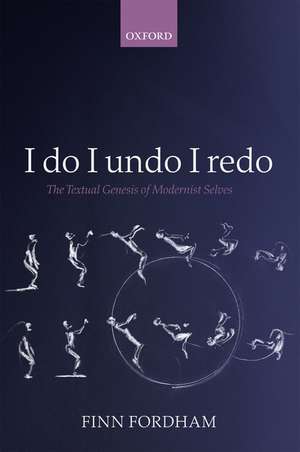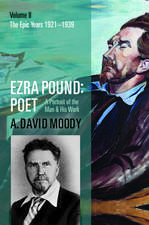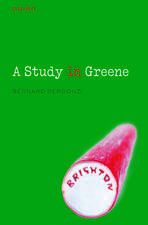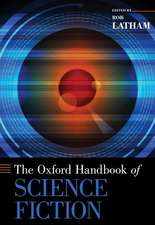I do I undo I redo: The Textual Genesis of Modernist Selves
Autor Finn Fordhamen Limba Engleză Hardback – 14 ian 2010
Preț: 863.65 lei
Preț vechi: 1241.36 lei
-30% Nou
Puncte Express: 1295
Preț estimativ în valută:
165.26€ • 173.01$ • 136.74£
165.26€ • 173.01$ • 136.74£
Carte tipărită la comandă
Livrare economică 27 martie-02 aprilie
Preluare comenzi: 021 569.72.76
Specificații
ISBN-13: 9780199569403
ISBN-10: 0199569401
Pagini: 294
Ilustrații: 7 black-and-white halftones
Dimensiuni: 161 x 241 x 20 mm
Greutate: 0.64 kg
Editura: OUP OXFORD
Colecția OUP Oxford
Locul publicării:Oxford, United Kingdom
ISBN-10: 0199569401
Pagini: 294
Ilustrații: 7 black-and-white halftones
Dimensiuni: 161 x 241 x 20 mm
Greutate: 0.64 kg
Editura: OUP OXFORD
Colecția OUP Oxford
Locul publicării:Oxford, United Kingdom
Recenzii
an essential addition to the corpus of Joycean genetic criticism.
Excellently researched and sensitively argued... Fordham's study says something highly original and persuasive about the self, and about the role modernism plays as a moment in its historical self-understanding.
Because of the sensitivity of analysis and the novelty of the thesis, Fordham's book is a contribution to the list of modern literature that should be read by all students
Finn Fordham... is a meticulous enquirer... This is an elegant, ambitious book on key modernist works... it comprises an exceptionally full account... One of the central attractions... is its spirited defence of genetic criticism as a scholarly enterprise, and Fordham's analyses of manuscripts are models of seriousness and subtlety... The overall feel is of a searching, energetic study.... Fordham manages the difficult balance of conceptual speculation and biographical narrative with real dexterity... Fordham has produced a deeply impressive case for the possibilities of genetic criticism.
The extraordinary analytical capacity of Fordham's critical approach becomes abundantly apparent... when he moves to examine the practices and products of six major writers of the 'long modernist' period... Fordham's attentiveness to the intertwined historical biographical, psychological, and thematic implications of manuscript revisions lends exceptional richness and depth to his account... In modelling a phenomenology of the writing process that is as rigorous as it is imaginative... Fordham has written one of those rare books that offers a genuinely innovative way of doing literary studies. As such, it deserves the widest possible audience.
I do I undo I redo addresses a phenomenally ambitious set of questions about writing and subjectivity. Finn Fordham's central hypothesis is a fascinating and original one: that there is a formative relationship between the processes and experiences of textual composition and authorial articulations of the self in writing-or, to use a formula that echoes throughout this study, that 'Formation shapes content'... Fordham has infused his study with a rare and compelling sense of relish and excitement. The prose scintillates... Fordham's book does what it knows it can do exceptionally well: lucid, meticulous and daring, it is one of the most engaging works of literary criticism published in recent times.
This book, then, is not only a contribution to theories of selfhood, but to philosophies of technology, broadlyrichlyconstrued
Excellently researched and sensitively argued... Fordham's study says something highly original and persuasive about the self, and about the role modernism plays as a moment in its historical self-understanding.
Because of the sensitivity of analysis and the novelty of the thesis, Fordham's book is a contribution to the list of modern literature that should be read by all students
Finn Fordham... is a meticulous enquirer... This is an elegant, ambitious book on key modernist works... it comprises an exceptionally full account... One of the central attractions... is its spirited defence of genetic criticism as a scholarly enterprise, and Fordham's analyses of manuscripts are models of seriousness and subtlety... The overall feel is of a searching, energetic study.... Fordham manages the difficult balance of conceptual speculation and biographical narrative with real dexterity... Fordham has produced a deeply impressive case for the possibilities of genetic criticism.
The extraordinary analytical capacity of Fordham's critical approach becomes abundantly apparent... when he moves to examine the practices and products of six major writers of the 'long modernist' period... Fordham's attentiveness to the intertwined historical biographical, psychological, and thematic implications of manuscript revisions lends exceptional richness and depth to his account... In modelling a phenomenology of the writing process that is as rigorous as it is imaginative... Fordham has written one of those rare books that offers a genuinely innovative way of doing literary studies. As such, it deserves the widest possible audience.
I do I undo I redo addresses a phenomenally ambitious set of questions about writing and subjectivity. Finn Fordham's central hypothesis is a fascinating and original one: that there is a formative relationship between the processes and experiences of textual composition and authorial articulations of the self in writing-or, to use a formula that echoes throughout this study, that 'Formation shapes content'... Fordham has infused his study with a rare and compelling sense of relish and excitement. The prose scintillates... Fordham's book does what it knows it can do exceptionally well: lucid, meticulous and daring, it is one of the most engaging works of literary criticism published in recent times.
This book, then, is not only a contribution to theories of selfhood, but to philosophies of technology, broadlyrichlyconstrued
Notă biografică
Finn Fordham took studied English at Trinity College Cambridge and then went on to work with Steven Connor at Birkbeck College London. He wrote a thesis on Joyce's Finnegans Wake (which, unfortunately, ran into copyright problems) but then, with a Leverhulme Fellowship, wrote a different study of Finnegans Wake (which, fortunately, didn't). He has published widely and edited volumes on 'transcultural hoaxes', on Joyce and the 19th Century French Novel. He has been invited to give talks around the world, including in Poland, Beijing, Belgrade, Trieste, Dublin, St Andrew's, Oxford, Chicago. He is currently a lecturer in English at Royal Holloway, University of London.












